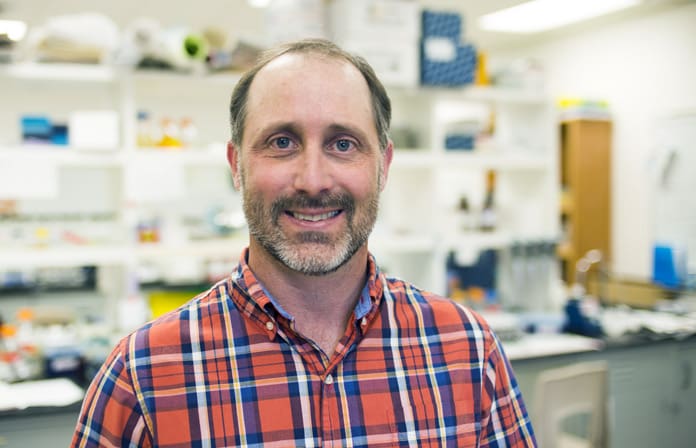
Biography
Dr. Michael Morrow obtained his Ph.D. in Cellular, Molecular and Developmental Biology from the University of Pittsburgh (2001) where he studied protein secretion in the yeast Saccharomyces cerevisiae. At Montana Western, Dr. Morrow and his undergraduate student researchers are studying some of the proteins that play roles in the early secretory pathway of the pathogenic yeast Candida albicans. Since protein secretion is important for this organism to cause infection, a better understanding of the machinery involved in protein secretion could lead to the identification of future drug targets to prevent and treat Candida infections. In addition to this research focus, Dr. Morrow is also interested in applied microbiology projects including a new project that is investigating the prevalence of antibiotic resistance genes in E. coli strains isolated from local streams and rivers in an effort to determine if wild E. coli populations could act as a reservoir for antibiotic resistance in bacterial populations. Dr. Morrow regularly teaches Discover Biology (BIOB101), Principles of Living Systems (BIOB160), Cellular and Molecular Biology (BIOB260), General Microbiology (BIOM260) and Advanced Cellular and Molecular Biology (BIOB425). Using Montana Western’s unique block scheduling allows Dr. Morrow to utilize many block-long research projects in his classes to provide students with hands on practical experience with many modern cell/molecular and microbiological techniques. Outside of school, Dr. Morrow enjoys backpacking, hiking, hunting and ice hockey (Let’s Go Pens!).
Selected Publications
Hamner, S, S.D. Fenster, B.T. Nance, K.A. McLain, K.S. Parrish-Larson, M.W. Morrow, T.E. Ford. (2019). Unexpected Prevalence of eae-Positive Escherichia coli in the Animas River, Durango, Colorado. International Journal of Environmental Research and Public Health. 17(1): 195. Doi 10.3390/ijerph 17010195.
Morrow, M.W., M.R. Janke*, K. Lund*, E. Morrison and B.A. Paulson. (2011). The Candida albicans Kar2 protein is essential and functions during the translocation of proteins into the endoplasmic reticulum. Curr. Genet. 57 (1): 25-37.
Brodsky, J.L. and Morrow, M.W. (2010) Protein Import into the Yeast Endoplasmic Reticulum: Methods. In:Encyclopedia of Life Sciences 2010, John Wiley and Sons, Ltd: Chichester http://www.els.net/ [DOI: 10.1002/9780470015902.a0002619.pub3]
Kabani, M., S. H. Stewart*, M. W. Morrow, D. L. Montgomery, R. Sivendran. M. D. Rose, L. M. Gierasch and J. L. Brodsky. (2003). Dependence of endoplasmic reticulum associated degradation (ERAD) on the peptide binding domain and concentration of BiP. Mol. Biol. Cell. 14: 3437-3448.
Morrow, M. W. and J. L. Brodsky. (2001) Yeast ribosomes bind to highly purified reconstituted Sec61p complex and to mammalian p180. Traffic 2: 705-716.
Selected Presentations:
Price, M.* and M.W. Morrow. The Sec61 protein plays a role in the translocation of secretory proteins across the endoplasmic reticulum membrane in the pathogenic yeast Candida albicans. American Society for Microbiology General Meeting. May 2014. Boston, MA
Kortum, A.* and M.W. Morrow. Characterization of the Candida albicans Sec63 Protein. American Society for Microbiology General Meeting. May 2011. New Orleans, LA.
Morrow, M.W., B.A. Paulson, M.R. Janke*, K. Lund*, E.P. Morrison. Candida albicans Kar2p is essential and functions during protein translocation into the endoplasmic reticulum. National IDeA Symposium of Biomedical Research Excellence Conference. June 2010. Bethesda, MD.
Kortum, A.* and M.W. Morrow. The Candida albicans SEC63 gene is essential. National IDeA Symposium of Biomedical Research Excellence Conference. June 2010. Bethesda, MD.
M.W. Morrow. The candida albicans Kar2 protein is essential and functions during the import of secretory proteins into the endoplasmic reticulum. 2010 Big Sky Mycology Meeting. May 2010. Bozeman, MT
Kortum, A.* and M.W. Morrow. Can the pathogenic yeast Candida albicans live without the SEC63 gene? National Conference on Undergraduate Research. April 2010. Missoula, MT.
